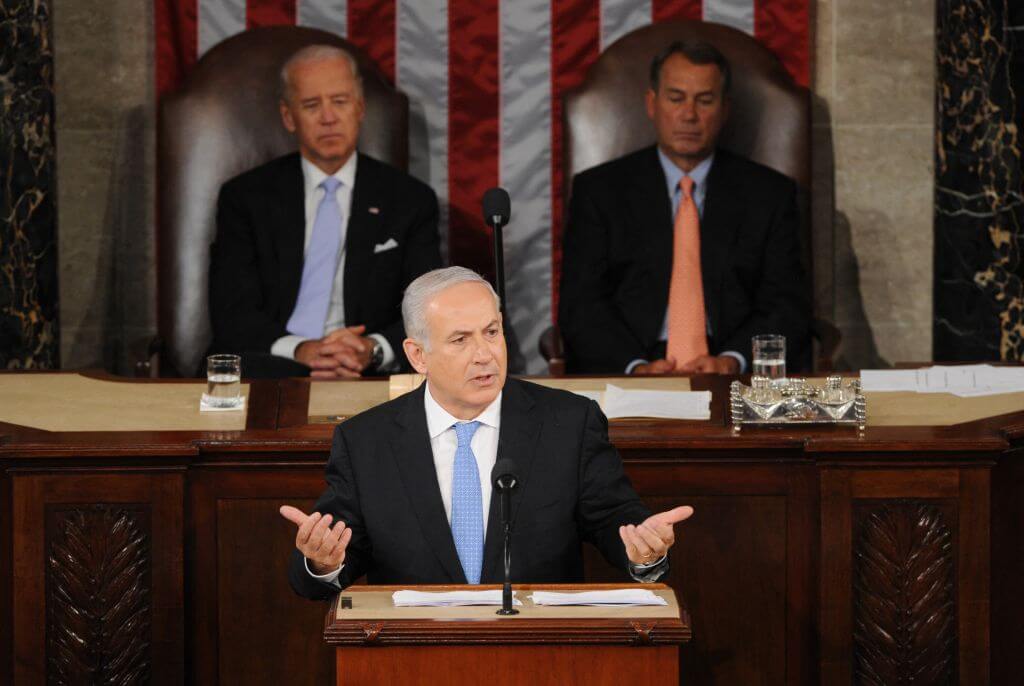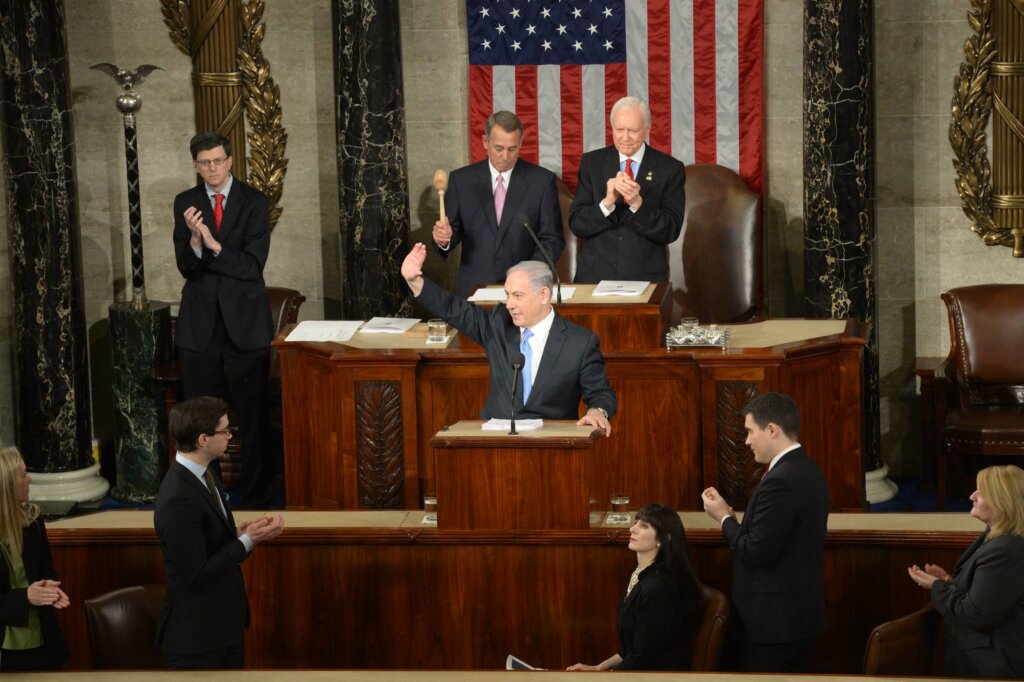Analysis: The risks and rewards of inviting Netanyahu to address Congress
Israeli Prime Minister Benjamin Netanyahu is determined to shift US public opinion about the war in Gaza

Israeli Prime Minister Benjamin Netanyahu speaks during a joint meeting of Congress on May 24, 2011. Photo by SAUL LOEB/AFP via Getty Images
House Speaker Mike Johnson announced Thursday that Israeli Prime Minister Benjamin Netanyahu would address a joint session of Congress. “This will be a timely and I think a very strong show of support to the Israeli government in their time of greatest need,” he said.
🚨House Speaker Johnson, at Israeli embassy reception, announces Netanyahu will be addressing a joint session of Congress.
— Jacob N. Kornbluh (@jacobkornbluh) May 23, 2024
“This will be a timely and I think a very strong show of support to the Israeli government in their time of greatest need.”https://t.co/P9SFVjouPu pic.twitter.com/4r0iJLw4GS
Now the calculus begins: Who could this speech benefit, and who could it hurt?
The invite divided Democrats even when it was just a rumor. On the left flank of the party, critics of Israel don’t want Congress to give a platform to the prime minister, who is widely reviled for embracing right-wing extremists within his government and prosecuting a war in Gaza that has resulted in the deaths of tens of thousands.
But mainstream pro-Israel Democrats don’t necessarily want to welcome him either. Many of them are also frustrated by Netanyahu, but prefer to avoid the inevitable calls to boycott the democratically elected leader of a country they otherwise support.
Schumer, who signed off on the invitation, earlier this year called for new Israeli elections, He said in a speech to Jewish Democrats on Monday that he’s been challenged by Republicans who try to use Israel as a political issue.
“We can’t have half of America desert Israel, whether it’s the younger half or the more progressive half,” Schumer said at the Jewish Democratic Council of America leadership summit in Washington, D.C. “That hurts Israel.”
The GOP, generally united in its support of Israel, has often pointed to the significant minority of Democrats who consistently condemn the Jewish state.
Some senior Democrats, including former House Speaker Nancy Pelosi, had urged Schumer not to support an invitation to Netanyahu.
“Israel is just another issue that Republicans are trying to gain an advantage on,” said Sen. Chris Murphy, a Democrat from Connecticut. “If he’s going to come here and pick a fight with Democrats, I don’t know that that helps anybody.”
More than a dozen Democrats have already said they would boycott the address.

If there are risks for Democrats in a Netanyahu address, so are there for the prime minister himself.
A polarizing figure in American politics with low approval ratings at home, an appearance before a joint session of Congress could further strain U.S.-Israeli relations and bipartisan cooperation in Congress on Israel’s behalf.
But Netanyahu, determined to shift U.S. public opinion about the ongoing war against Hamas in Gaza, is prepared to take those risks. The fluent English speaker, who was raised in Philadelphia and holds degrees from MIT, is confident in his own abilities to sway American audiences, and bolster his image as a defender of Israeli interests as his country becomes increasingly isolated over the war in Gaza. The longtime premier has already delivered three speeches to a joint session of Congress. And he’s been interviewed dozens of times by major U.S. networks since Oct. 7.
In 2015, Netanyahu chose to defy President Barack Obama by speaking directly to Congress against the U.S.-brokered Iran nuclear deal. The speech was boycotted by 58 Democrats and no Obama administration officials attended.
Netanyahu believes it helped his cause. In his recent memoir, he wrote that Schumer, then-Senate minority leader and an opponent of the deal, approached him after the speech and said it moved six Democrats to support a Republican-led bill that would give Congress the ability to review and vote on the deal. (It eventually passed Congress, 98-1 in the Senate and 400-25 in the House.)
Netanyahu also suggested that the speech helped solidify secret ties with some Arab countries, leading to the Abraham Accords brokered by the Trump administration in 2020, which normalized relations between Israel and four Arab nations.
And Mark Regev, a former spokesperson and close adviser to Netanyahu, said last month that the heightened tension between the Israeli government and the Biden administration is a price worth paying to achieve “total victory” over Hamas.
But despite rising tensions with the Biden administration, Netanyahu may have already secured most of what he needs from the U.S.
Support for Israel remains strong in Congress, and just last month the Senate approved $14.3 billion in emergency military aid for Israel on a bipartisan vote of 70-29 — even as support for foreign aid diminishes in both parties. And in recent days, Republicans and Democratic leaders harshly criticized the International Criminal Court’s application to issue arrest warrants for Israeli leaders, along with Hamas’. And efforts are underway to pass a bipartisan package of sanctions against the court.
There’s another reason Netanyahu may relish the chance to speak to Congress. It may give him the White House reception he has sought since returning to the prime minister’s office in December 2022. Biden has refused to invite him due to Netanyahu’s support for an overhaul of Israel’s judicial system that many call undemocratic. But the president cannot afford to snub him in an election year.
What the voters think
A speech before Congress could inflame Democrats already angry with Netanyahu for the death toll in Gaza. A recent Grinnell College National Poll showed that 57% of Democrats view Netanyahu critically and 53% of Republicans view him favorably. The annual Pew Research poll showed that 53% of Americans, including 71% of Democrats, have little or no confidence in Netanyahu, while 38% of Democrats, including 32% of younger Americans, express no confidence in him. His extreme right-wing government’s push to the judicial overhaul last year only weakened his standing, including among liberal American Jews.

Most foreign leaders do not get invitations to address Congress. Netanyahu’s fourth such speech is sure to attract more boycotters than a much less polarizing Israeli did when he addressed Congress last year.
Then Sen. Bernie Sanders, the independent Jewish senator from Vermont, joined seven Democratic House members — Ilhan Omar, Alexandra Ocasio-Cortez, Rashida Tlaib, Cori Bush, Jamaal Bowman, Raul Grijalva and Nydia Velazquez — in boycotting Israeli President Issac Herzog’s speech to Congress to protest Israel’s treatment of the Palestinians.
Asked about where Schumer stands on the invitation to Netanyahu Monday, a spokesperson for the majority leader told Punchbowl that Johnson “cares more about hurting Democrats than protecting Israel which is why he brags about trying to divide Democrats.”





















